
Concept explainers
Find the slope
Answer to Problem 34P
The slope
The deflection
The slope
The slope
The deflection
Explanation of Solution
Given information:
The Young’s modulus (E) is 30,000 ksi.
The moment of inertia of the section AB is (I) is
The moment of inertia of the section BD is (I) is
Calculation:
Consider Young’s modulus (E) of the beam is constant.
To draw a
Show the free body diagram of the given beam as in Figure (1).
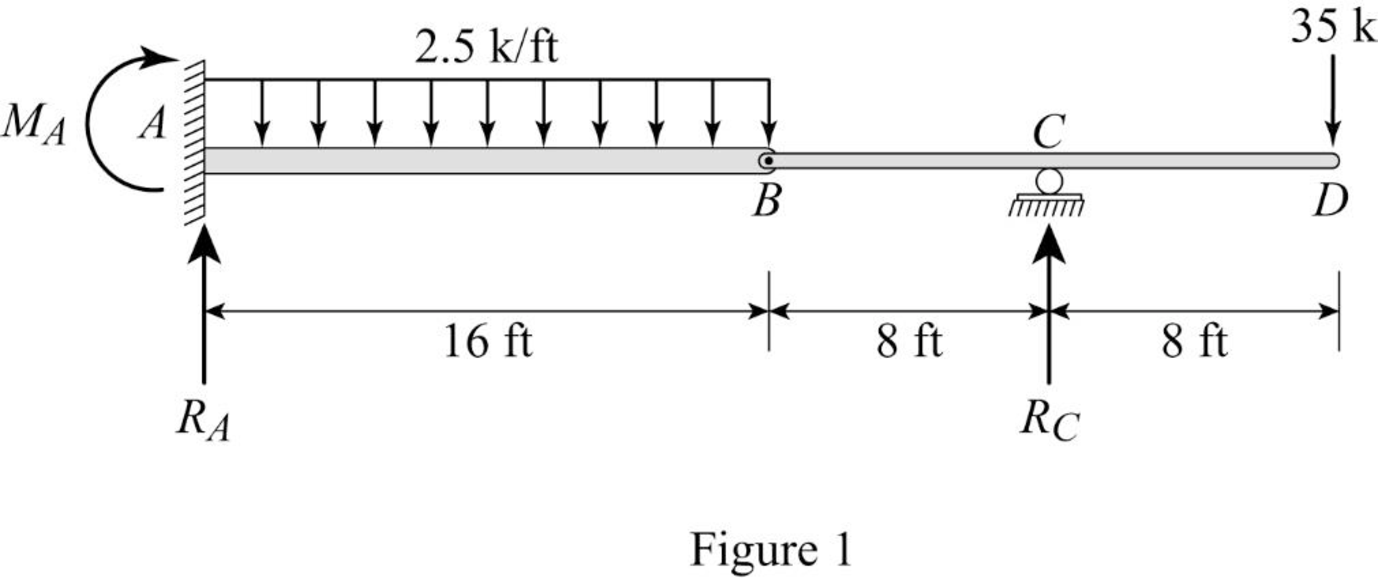
Refer Figure (1),
Consider upward is positive and downward is negative.
Consider clockwise is negative and counterclowise is positive.
Refer Figure (1),
Consider reaction at A and C as
Take moment about point B.
Determine the reaction at C;
Determine the reaction at support A;
Determine the moment at A:
Show the reactions of the given beam as in Figure (2).
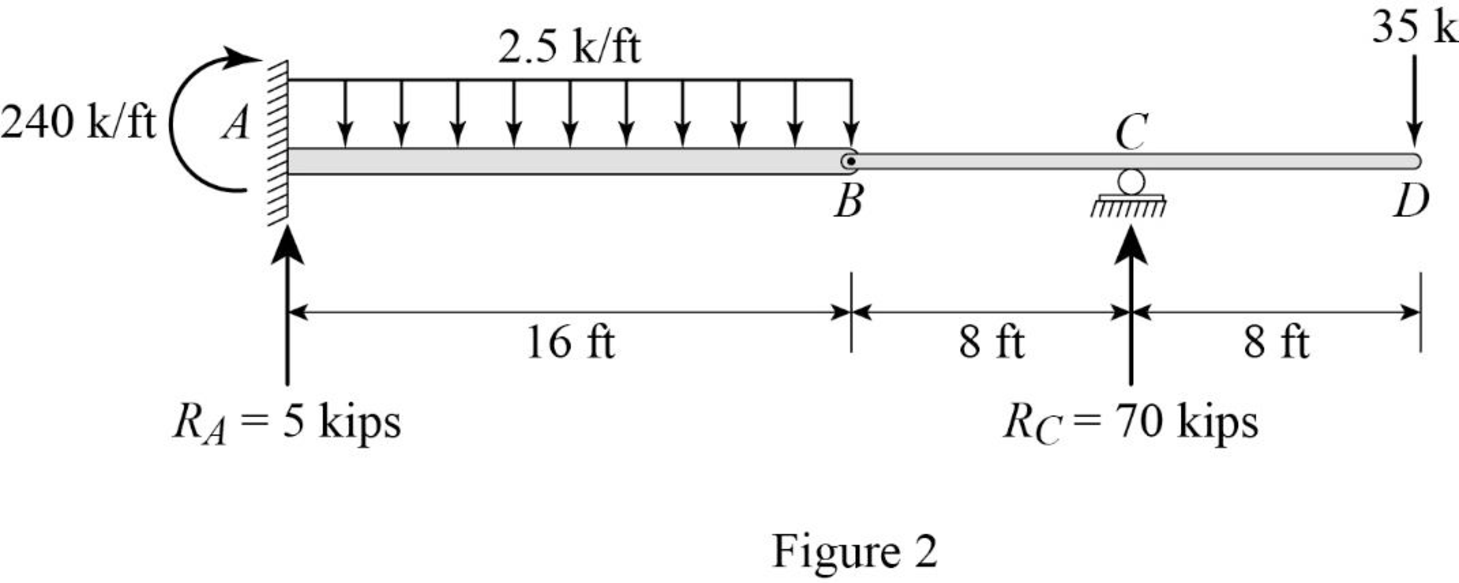
Determine the bending moment at B;
Determine the bending moment at C;
Determine the bending moment at D;
Determine the positive bending moment at A;
Show the reaction and point load of the beam as in Figure (3).
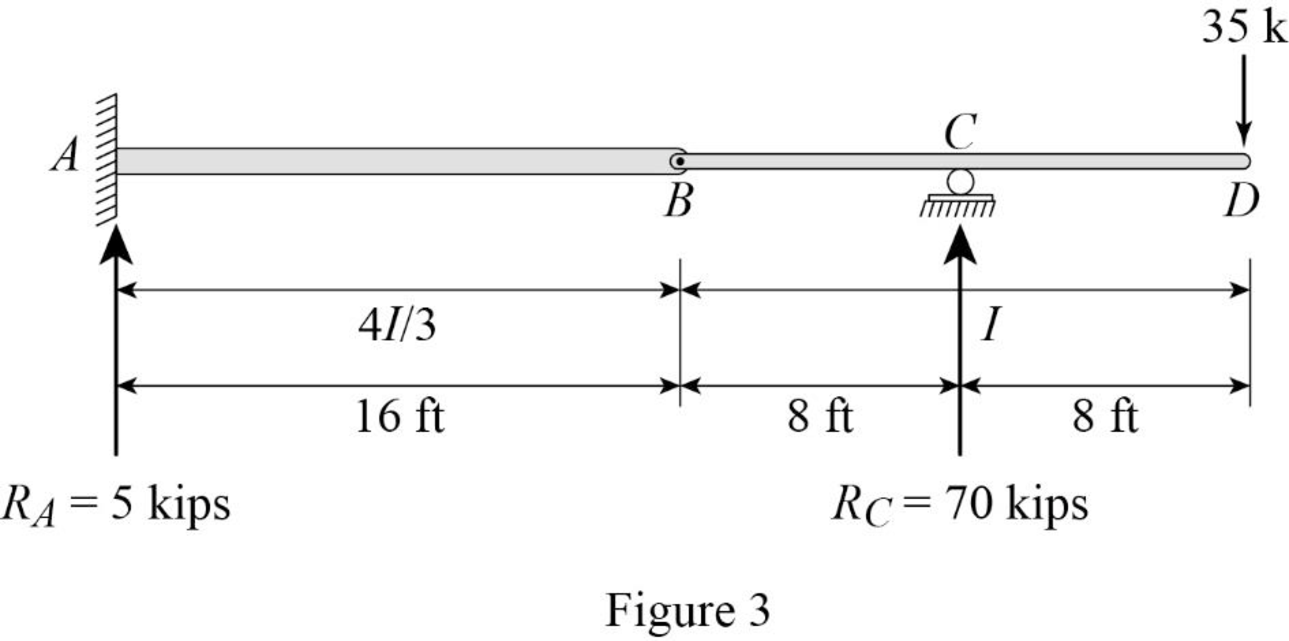
Determine the value of
Substitute
Show the
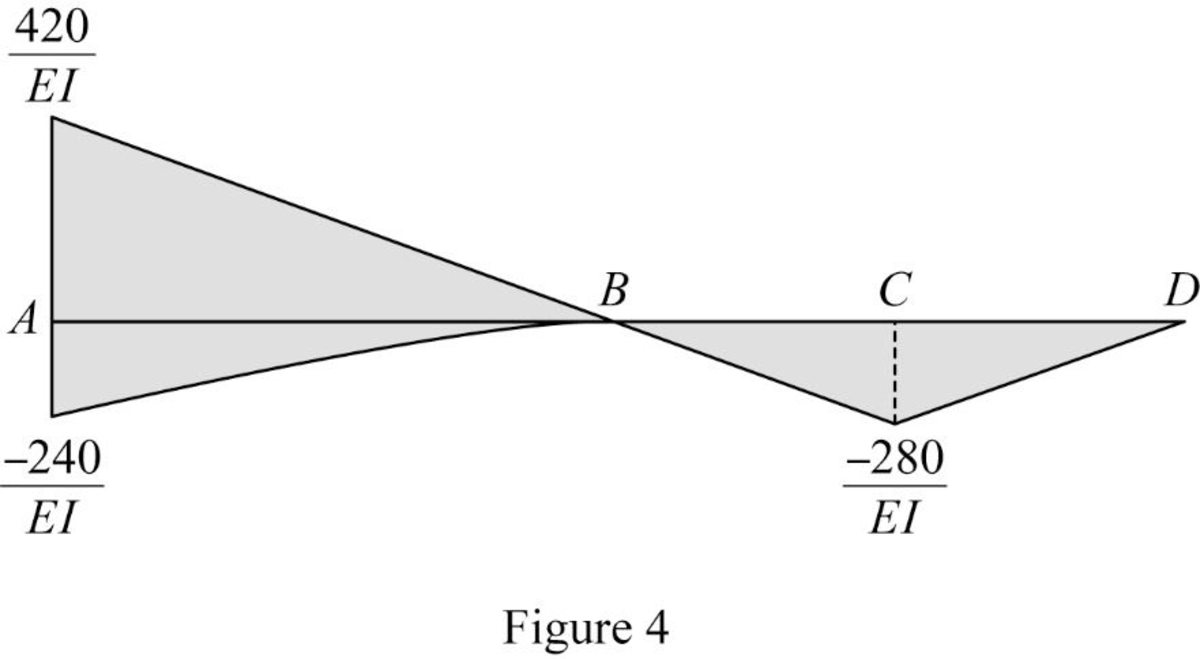
Show the elastic curve as in Figure (5).
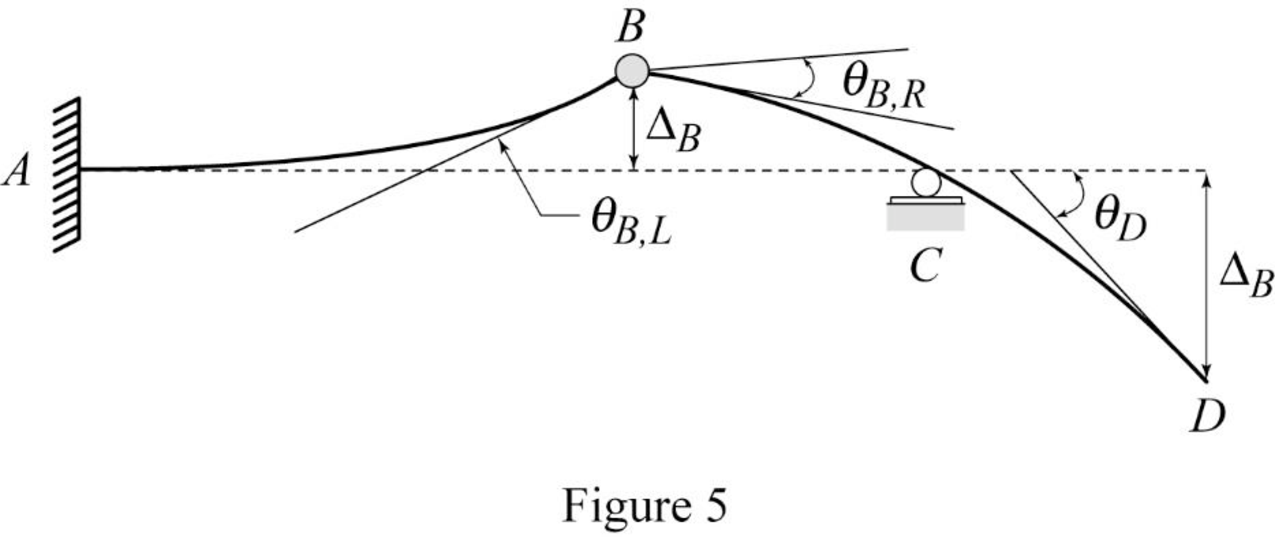
The slope at point B can be calculated by evaluating the change in slope between A and B.
Express the change in slope using the first moment-area theorem as follows:
Here, b is the width and h is the height of the respective triangle and rectangle.
Substitute 16 ft for
Determine the slope B (left) using the relation;
Substitute 30,000 ksi for E and
Hence, the slope at B (left) is
Determine the deflection at B using the relation;
Substitute
Determine the deflection at B (left) using the relation;
Substitute 30,000 ksi for E and
Hence, the deflection at B (left) is
Determine the deflection between B and C using the relation;
Here, b is the width and h is the height of the triangle.
Substitute 8 ft for b and
Express the relationship between the deflection and slope of span BC as follows:
Here,
Substitute
Determine the slope between B and C using the relation;
Substitute 8 ft for b and
Determine the slope at B (right) using the relation;
Substitute
Substitute 30,000 ksi for E and
Hence, the slope at B (right) is
Determine the slope between C and D using the relation;
Here, b is the width and h is the height of the triangle.
Substitute 8 ft for b and
Determine the slope at D using the relation;
Substitute
Substitute 30,000 ksi for E and
Hence, the slope at point D is
Determine the deflection between C and D using the relation;
Substitute
Determine the deflection at point D using the relation;
Substitute 8 ft for
Substitute 30,000 ksi for E and
Hence, the deflection at point D is
Want to see more full solutions like this?
Chapter 6 Solutions
STRUCTURAL ANALYSIS (LL)
- Show step by step solutionarrow_forwardDraw the shear and the moment diagrams for each of the frames below. If the frame is statically indeterminate the reactions have been provided. Problem 1 (Assume pin connections at A, B and C). 30 kN 2 m 5 m 30 kN/m B 60 kN 2 m 2 m A 22 CO Carrow_forwardThis is an old exam practice question. The answer key says the answer is Pmax = 52.8kN but I am confused how they got that.arrow_forward
- F12-45. Car A is traveling with a constant speed of 80 km/h due north, while car B is traveling with a constant speed of 100 km/h due east. Determine the velocity of car B relative to car A. pload Choose a File Question 5 VA - WB VBA V100 111413 + *12-164. The car travels along the circular curve of radius r = 100 ft with a constant speed of v = 30 ft/s. Determine the angular rate of rotation è of the radial liner and the magnitude of the car's acceleration. Probs. 12-163/164 pload Choose a File r = 400 ft 20 ptsarrow_forwardPlease show step by step how to solve this and show formulararrow_forwardPlease solve this question step by step with dia gramarrow_forward
- Use the second picture to answer the question, Thank you so much for your help!arrow_forwardP6.16 A compound shaft (Figure P6.16) consists of a titanium alloy [G= 6,200 ksi] tube (1) and a solid stainless steel [G= 11,500 ksi] shaft (2). Tube (1) has a length L₁ = 40 in., an outside diameter D₁ = 1.75 in., and a wall thickness t₁ = 0.125 in. Shaft (2) has a length 42 = 50 in. and a diameter d₂ = 1.25 in. If an external torque TB = 580 lb ft acts at pulley B in the direction shown, calculate the torque Tcrequired at pulley C so that the rotation angle of pulley Crelative to A is zero. B Te (2) TB (1) FIGURE P6.16arrow_forward7.43 Neglecting head losses, determine what horsepower the pump must deliver to produce the flow as shown. Here, the elevations at points A, B, C, and D are 124 ft, 161 ft, 110 ft, and 90 ft, respectively. The nozzle area is 0.10 ft². B Nozzle Water C Problem 7.43arrow_forward
- A 1.8m x 1.8m footing is located at a depth of 1 m below the ground surface in a deep deposit of compacted sand (f'= 33 , f' = 28 , γ = 17.5 kN/m). Calculate the ultimate net bearing capacity considering several factors (e.g., shape, depth, and inclination) when the groundwater table is located (a) at 5 m below the footing base, (b) at the ground surface, (c) at the footing base, and (d) at 1.5 m below the footing base. Also, explain the effects of the groundwater levels in the bearing capacities of the footing with your own words. If the information is not given for the calculation, please assume it reasonably.arrow_forward7.18 Determine the discharge in the pipe and the pressure at point B. Neglect head losses. Assume α = 1.0 at all locations. 1.5 m Water B 3.5 m 40 cm diameter -20 cm diameter nozzle Problem 7.18arrow_forwardA 200-lb block is at rest on a 30° inclined plane. The coefficient of friction between the block and the inclined plane is 0.20. Compute the value of a horizontal force P that will cause motion to impend the block up the inclined plane. 200 lb P 30°arrow_forward
